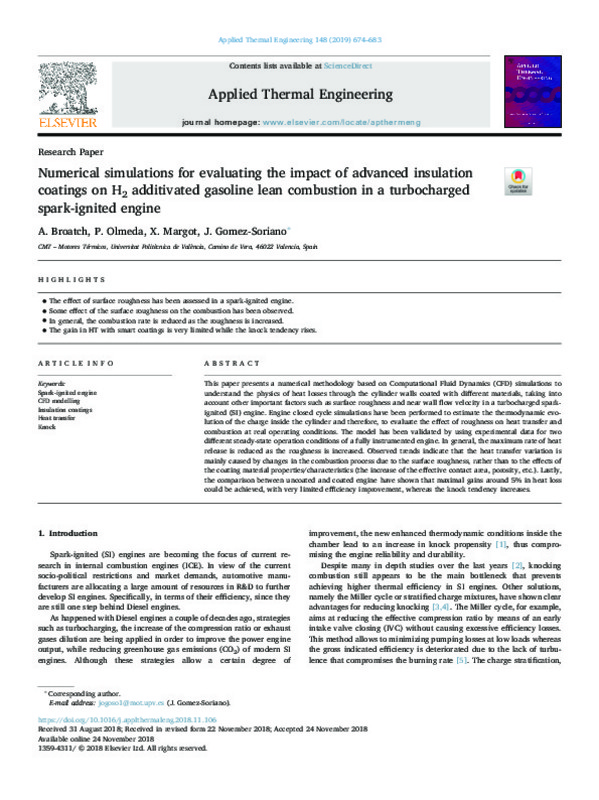JavaScript is disabled for your browser. Some features of this site may not work without it.
Buscar en RiuNet
Listar
Mi cuenta
Estadísticas
Ayuda RiuNet
Admin. UPV
Numerical simulations for evaluating the impact of advanced insulation coatings on H2 additivated gasoline lean combustion in a turbocharged
Mostrar el registro sencillo del ítem
Ficheros en el ítem
| dc.contributor.author | Broatch, A.
|
es_ES |
| dc.contributor.author | Olmeda, P.
|
es_ES |
| dc.contributor.author | Margot, Xandra
|
es_ES |
| dc.contributor.author | Gómez-Soriano, Josep
|
es_ES |
| dc.date.accessioned | 2019-10-24T06:46:09Z | |
| dc.date.available | 2019-10-24T06:46:09Z | |
| dc.date.issued | 2019 | es_ES |
| dc.identifier.issn | 1359-4311 | es_ES |
| dc.identifier.uri | http://hdl.handle.net/10251/129375 | |
| dc.description.abstract | [EN] This paper presents a numerical methodology based on Computational Fluid Dynamics (CFD) simulations to understand the physics of heat losses through the cylinder walls coated with different materials, taking into account other important factors such as surface roughness and near wall flow velocity in a turbocharged spark-ignited (SI) engine. Engine closed cycle simulations have been performed to estimate the thermodynamic evolution of the charge inside the cylinder and therefore, to evaluate the effect of roughness on heat transfer and combustion at real operating conditions. The model has been validated by using experimental data for two different steady-state operation conditions of a fully instrumented engine. In general, the maximum rate of heat release is reduced as the roughness is increased. Observed trends indicate that the heat transfer variation is mainly caused by changes in the combustion process due to the surface roughness, rather than to the effects of the coating material properties/characteristics (the increase of the effective contact area, porosity, etc.). Lastly, the comparison between uncoated and coated engine have shown that maximal gains around 5% in heat loss could be achieved, with very limited efficiency improvement, whereas the knock tendency increases. | es_ES |
| dc.description.sponsorship | J. Gomez-Soriano is partially supported through the Programa de Apoyo para la Investigation y Desarrollo (PAID) of Universitat Politecnica de Valencia [Grant No. FPI-S2-2016-1353]. | es_ES |
| dc.language | Inglés | es_ES |
| dc.publisher | Elsevier | es_ES |
| dc.relation.ispartof | Applied Thermal Engineering | es_ES |
| dc.rights | Reconocimiento - No comercial - Sin obra derivada (by-nc-nd) | es_ES |
| dc.subject | Spark-ignited engine | es_ES |
| dc.subject | CFD modelling | es_ES |
| dc.subject | Insulation coatings | es_ES |
| dc.subject | Heat transfer | es_ES |
| dc.subject | Knock | es_ES |
| dc.subject.classification | MAQUINAS Y MOTORES TERMICOS | es_ES |
| dc.subject.classification | INGENIERIA AEROESPACIAL | es_ES |
| dc.title | Numerical simulations for evaluating the impact of advanced insulation coatings on H2 additivated gasoline lean combustion in a turbocharged | es_ES |
| dc.type | Artículo | es_ES |
| dc.identifier.doi | 10.1016/j.applthermaleng.2018.11.106 | es_ES |
| dc.relation.projectID | info:eu-repo/grantAgreement/EC/H2020/724084/EU/Efficient Additivated Gasoline Lean Engine/ | es_ES |
| dc.rights.accessRights | Abierto | es_ES |
| dc.contributor.affiliation | Universitat Politècnica de València. Departamento de Máquinas y Motores Térmicos - Departament de Màquines i Motors Tèrmics | es_ES |
| dc.description.bibliographicCitation | Broatch, A.; Olmeda, P.; Margot, X.; Gómez-Soriano, J. (2019). Numerical simulations for evaluating the impact of advanced insulation coatings on H2 additivated gasoline lean combustion in a turbocharged. Applied Thermal Engineering. 148:674-683. https://doi.org/10.1016/j.applthermaleng.2018.11.106 | es_ES |
| dc.description.accrualMethod | S | es_ES |
| dc.relation.publisherversion | https://doi.org/10.1016/j.applthermaleng.2018.11.106 | es_ES |
| dc.description.upvformatpinicio | 674 | es_ES |
| dc.description.upvformatpfin | 683 | es_ES |
| dc.type.version | info:eu-repo/semantics/publishedVersion | es_ES |
| dc.description.volume | 148 | es_ES |
| dc.relation.pasarela | S\373702 | es_ES |
| dc.contributor.funder | European Commission | es_ES |








